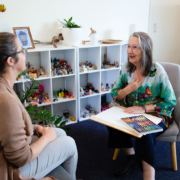Phenomenology: Understanding Human Experience
Definition and Historical Origins
Phenomenology is the study of how humans give shape and meaning to their experiences. It is one of the key theoretical foundations of Gestalt therapy. In the early 20th century, phenomenology was developed by philosophers like Edmund Husserl, who introduced a method for exploring “phenomena” as they appear in consciousness, free from preconceived notions or assumptions.
Husserl coined the concept of bracketing, which involves setting aside habitual beliefs to observe experience as it is lived. This practice became central to understanding human consciousness not through theories, but through direct experience.
Maurice Merleau-Ponty expanded on Husserl’s ideas by emphasizing the centrality of the body in perception. For him, our embodied presence is not something separate from thought—it is through our bodies that we perceive, interact with, and make sense of the world.
Martin Heidegger, another major influence, explored being-in-the-world as a relational, dynamic process. He argued that human existence is always situated, and that understanding the world begins with our own presence within it.
Everyday Experience of Phenomenology
Phenomenology invites us to notice how we are experiencing the world, moment by moment. Consider two friends viewing the same painting. One might notice the light and brushwork and feel awe. The other might be reminded of a memory from the bush and feel discomfort. Their experience of the same image is shaped by their personal histories, emotions, and associations.
This approach emphasizes subjectivity. It reminds us that each person’s experience is unique, and shaped by layers of perception, memory, mood, and relationship. Phenomenology gives us tools to understand these differences not as distortions of truth, but as truths in themselves—windows into what it means to be human.
Phenomenology in Therapy
In the therapy room, phenomenology appears as a quiet, attentive presence. The therapist listens with openness, allowing the client’s lived experience to unfold at its own pace. Rather than interpreting or analysing, the therapist is curious: “What was that like for you?” They explore the experience with wonder and respect.
The therapist also practices bracketing their own judgments and theories, meeting the client as they are. This creates space for clients to describe and reflect on their experiences without fear of being corrected or misunderstood. Together, they investigate the textures of experience—sensations, memories, feelings, meanings.
For example, a client might describe feeling a “tightness” in their chest when talking about a family gathering. Rather than assuming this tightness is anxiety or sadness, the therapist stays close to the client’s experience, asking gentle questions: “Can you say more about the tightness?” or “What happens as you notice it?” The client might discover that the sensation is linked to a long-standing feeling of being unseen in their family. Through this phenomenological exploration, the bodily sensation becomes a doorway to deeper self-awareness and healing, rather than something to be quickly labelled or fixed.
Phenomenology in therapy supports a deep sense of empathy. The therapist attunes not only to the client’s words but also to their gestures, pauses, and embodied presence. In doing so, the therapy process honours the complexity and dignity of the client’s experience.
Phenomenology in Relationships and Groups
Phenomenology brings valuable insight to relationships and group dynamics. It highlights how people experience one another, and how misunderstandings often arise from unspoken assumptions or unseen perspectives.
In close relationships, phenomenology can help partners listen more fully to one another’s lived reality. One person’s care might be experienced as control. A desire for connection might come across as neediness. Understanding these subjective experiences invites empathy and clarity.
In parent-child relationships, phenomenology encourages deeper dialogue. A child might experience concern as intrusion. A parent might experience silence as rejection. Exploring these lived meanings can repair trust and restore understanding.
In group settings, phenomenology helps illuminate the collective field: how individual experiences influence, reflect, and shape group identity. It supports authenticity and dialogue by creating room for each member’s voice and presence. This includes recognizing how social roles, norms, and expectations shape what is shared and what remains unspoken.
Conclusion: A Path to Presence and Meaning
Phenomenology offers a powerful way to approach human experience—not by explaining it from the outside, but by entering into it. Whether in therapy, art, or relationships, phenomenology reminds us to slow down, stay present, and listen deeply.
It offers a gentle but radical invitation: to meet others and ourselves not as fixed identities or problems to be solved, but as ever-unfolding mysteries, shaped by our bodies, our stories, and our ways of seeing.
By returning to the richness of lived experience, we rediscover meaning, connection, and possibility.
References
Clarkson, P. & Mackewn, J. (1993). Fritz Perls. Sage, London: Sage Press.
Joyce, P. & Sills, C. (2010). Skills in Gestalt Counselling & Psychotherapy. London: Sage Press.
Mackewn, J. (2012). Developing Gestalt Counselling. Los Angeles: Sage Press.
Skottun, G. Kruger, A (n.d.). Gestalt Therapy Practice: Therapy and Experiential Learning. London: Routledge.


